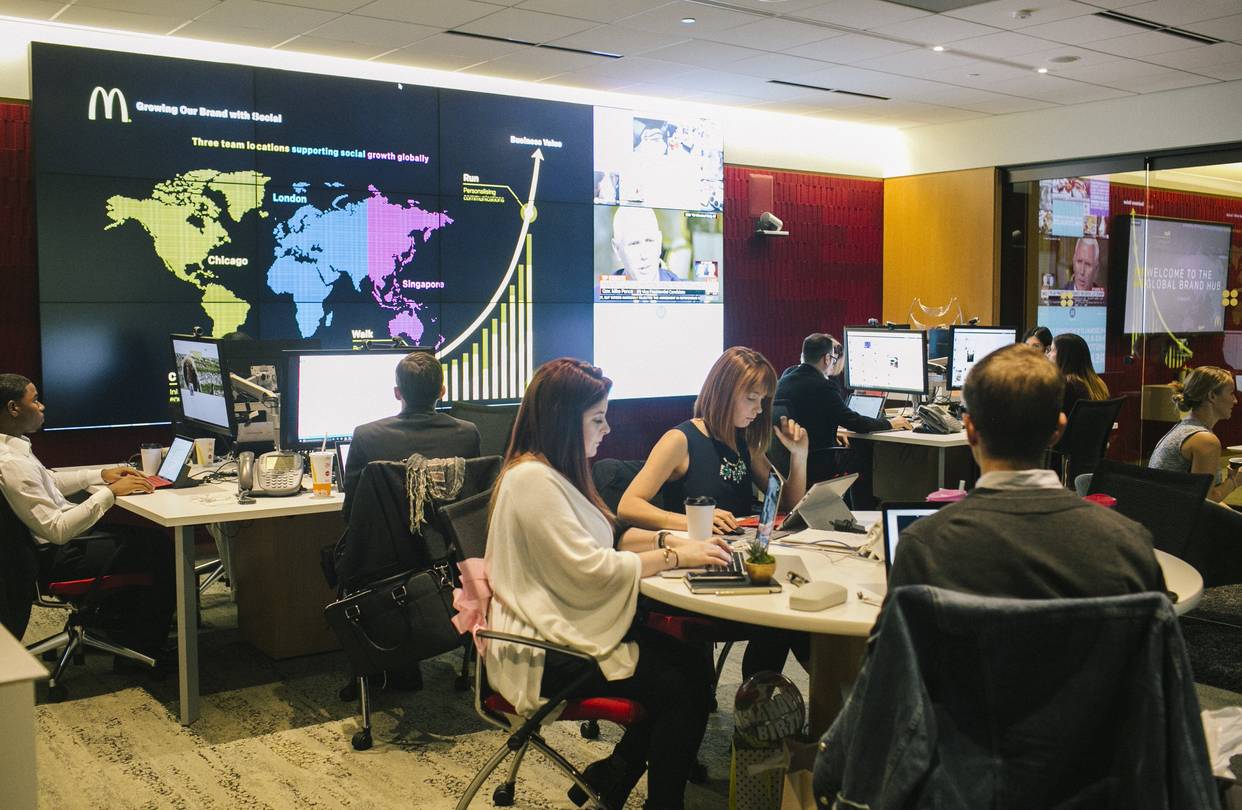

OAK BROOK, ILL.—How many people does it take for a 61-year-old burger maker to tweet? At least a dozen.
Inside a high-tech room at McDonald’s Corp.’s suburban Chicago headquarters, employees tap away at computers responding to tweets and crunching data on what’s trending on social media, long a standard practice at most consumer companies.
Companies such as online retailer Zappos.com Inc., coffee giant Starbucks Corp. and discount airline JetBlue Airways Corp. have been using social media for years to manage customer complaints and generate ideas.
But as recently as two years ago, McDonald’s had no way to consistently track and respond to what is being said about it online, a lost opportunity for a brand that gets mentioned on social media every one to two seconds.
“We seemed deaf and mute,” said Paul Matson, director of social and digital engagement at McDonald’s USA, a position created just last year.
Now, McDonald’s has a digital media hub in Singapore and London as well as the one in Oak Brook. It recently hired 200 people from companies such as Amazon.com Inc. andPayPal Holdings Inc. to bolster its digital efforts and win back the millennials it lost to rivals serving fresher food. Just one in five millennials has ever tried the company’s flagship Big Mac, according to an internal memo reviewed by The Wall Street Journal.
Although social media can be an effective tool for responding quickly to unhappy customers, some experts say all the focus on social networking yields little return.
“I think that companies have been so desperate to win over millennials that they’re placing too much faith on social network outreach,” saidRobert Passikoff, whose marketing firm Brand Keys has conducted studies showing that the number of tweets or Facebook likes a company gets doesn’t translate to increased sales.
Still, McDonald’s can’t afford to ignore social media.
Millennials were using twitter to bemoan the fact that breakfast at McDonald’s wasn’t available beyond 10:30 a.m., and awareness of that demand helped encourage McDonald’s last year to offer breakfast food all day.
The burger giant scored a win with 78% of millennials, on average, stating they visited a McDonald’s at least once a month or more in the first quarter of this year—a level of success with young customers that McDonald’s hadn’t seen in three years, according to market research firm Technomic Inc.
But McDonald’s sales growth slowed significantly in the second quarter, raising concerns that the bump from all-day breakfast may have run its course.
To keep sales going, McDonald’s is trying to better target youth with messages tailored to their concerns.
In preparation for a May advertising campaign about how a new searing method results in juicier Quarter Pounders, McDonald’s decided that rather than hold a focus group, it would work with Facebook to understand what millennials were saying on the site about beef.
McDonald’s tailored its marketing to that group with ads on Facebook and Instagram about the source, quality and taste of its burgers, and said “the results suggest that our customers appreciate and react accordingly when they receive communication that is tailored to them and their needs.”
McDonald’s USA Chief Marketing OfficerDeborah Wahl acknowledges millennials are tricky to influence because of their distrust of anything that seems staged. For that reason, McDonald’s recently stopped using photos of perfect-looking food in its advertising, opting instead for close-up shots that reveal a burger’s imperfections, including lettuce, which isn’t very photogenic.
Jackie Edmiston, a 31-year-old mom in Kansas City, Mo., has noticed. “The real produce on the sandwiches is a big improvement,” she said. “We’re all about authenticity and we don’t like to feel like we’re being played in any way.”
McDonald’s has also been courting young celebrities like Kylie Jenner, who attended a McDonald’s-sponsored Coachella party in April, where she posed for a photo of herself holding an Egg McMuffin. In less than 10 minutes, the photo received more than 100,000 “likes” on Instagram.
During a recent press event where McDonald’s announced it had removed artificial ingredients from some of its food, social media “influencers” were invited to “capture content” for Instagram. Consultant Mr. Passikoff says those kinds of efforts serve as entertainment but don’t result in young people buying more burgers.
Miranda Lang, a 21-year-old student in Washington, D.C., says such marketing moves feel forced and won’t convince her to go to a McDonald’s, a place she hasn’t visited since she was a child.
“I grew up hearing that McDonald’s was not good,” she said. “Because I have that mind-set so deeply ingrained in me, I haven’t taken the time to figure out if it is still true.”
[Source:-The Wall Street Journal]
